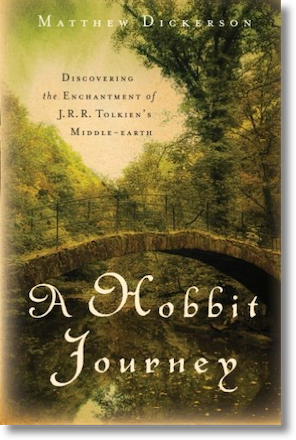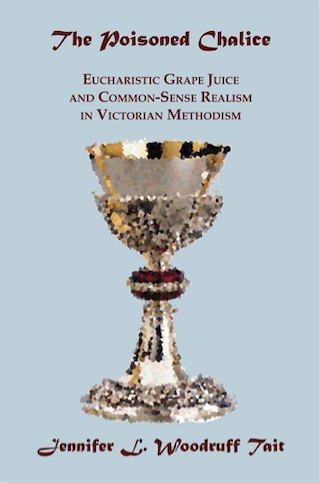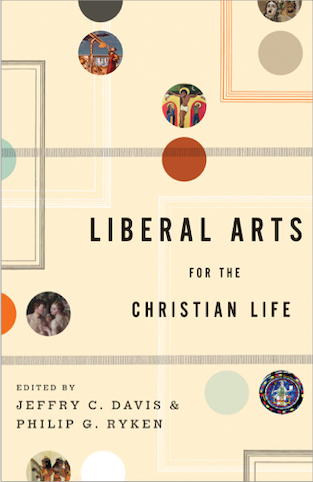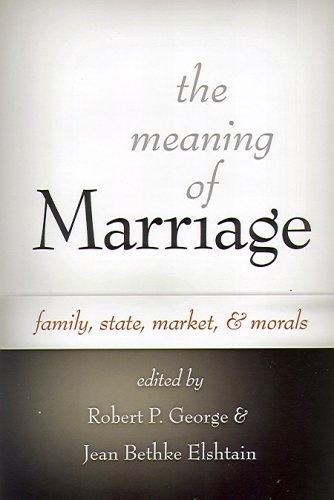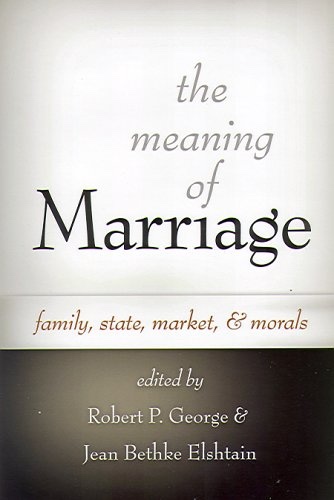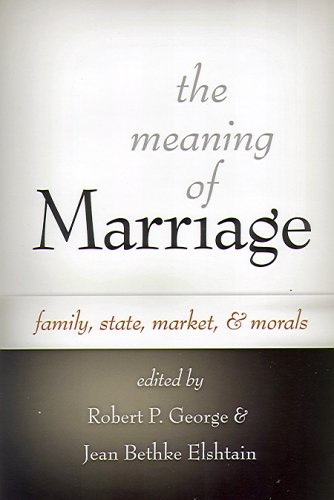PREVIEW
The player for this Journal volume is only available to current members or listeners with a legacy account. If you have an active membership, log in here. If you’d like to become a member — with access to all our audio programs — sign up here.
Guests heard on Volume 117
Matthew Dickerson, author of A Hobbit’s Journey: Discovering the Enchantment of J. R. R. Tolkien’s Middle-earth, on the likenesses between Beowulf and three of Tolkien’s heroes, and on how (despite Peter Jackson’s rendition) The Lord of the Rings is more interested in virtue than in military exploits
Jennifer Woodruff Tait, author of The Poisoned Chalice: Eucharistic Grape Juice and Common-Sense Realism in Victorian Methodism, on how assumptions about the nature of moral knowledge — derived from the school of common-sense realism — compelled Victorian Methodists and others to substitute grape juice for wine in celebrating the Lord’s Supper
Jeffry Davis and Philip Ryken, co-editors of Liberal Arts for the Christian Life, on why the liberal arts ought to be recognized as a calling that enriches Christian living
Robert P. George, editor of The Meaning of Marriage: Family, State, Market, and Morals, on the Supreme Court and marriage
Robert P. George, editor of The Meaning of Marriage: Family, State, Market, and Morals, on the meaning of marriage
Robert P. George, editor of The Meaning of Marriage: Family, State, Market, and Morals, on the consequences of redefining marriage
Related reading and listening
- How fantasy restores the world — In this 2019 lecture, Alison Milbank shows how fantasy can help restore to us a vision of human flourishing that counters the atomization and meaninglessness of modern life. (43 minutes)
- Embodied knowledge — FROM VOL. 121 James K. A. Smith advocates for a return to some pre-modern conceptualizations of the human body. (18 minutes)
- Counterpoint as a “spirited discussion” — In this essay, John Ahern explains the beauty and order of counterpoint, the accumulation of multiple melodies that come together in a harmonious whole. (20 minutes)
- The relationship between prudence and reality — In this lecture, Ken Myers explains how the virtue of prudence is fundamentally connected with a deep and anchored understanding of reality. (54 minutes)
- Why the sexual revolution “failed on its own terms” — FROM VOL. 38 Wendy Shalit argues that when promiscuity is considered natural, women lose the leverage and power inherent in modesty. (13 minutes)
- A metaphysics of realism, relationality, and personalism — John Milbank gives a survey and critique of the efforts of 20th and 21st century theologians to articulate a Trinitarian ontology that reflects reality and counters secularization. (61 minutes)
- Touch’d with a coal from heav’n — Daniel Ritchie finds in the poetry of William Cowper (1731–1800) an anticipation of Michael Polanyi’s epistemology
- How we know the world — Daniel Ritchie argues that poet and hymnodist William Cowper was ahead of his time in critiquing the Enlightenment’s reductionist view of knowledge. (16 minutes)
- William Cowper: Reconciling the Heart with the Head — Daniel E. Ritchie discusses the life and work of poet William Cowper (1731–1800), comparing his commitment to understanding reality through personal knowledge, intuition, and rigorous contemplation with the thought of Michael Polanyi. (43 minutes)
- Approaches to knowing — FROM VOL. 104 Daniel Ritchie describes how many of the figures he studies in his new book emphasize the significance of human experience, enculturation, and contingency to human knowledge. (21 minutes)
- Apprehending the enduring things — Vigen Guroian explains how children’s literature has the capacity to birth the moral imagination in our children, affirming for them the permanent things. (53 minutes)
- Festivity and the goodness of Creation — Drawing on Josef Pieper’s ideas, Ken Myers explains why the spirit of festivity is the spirit of worship, and that “entertainment” is ultimately an artificial, contrived, and empty effort to achieve festivity. (25 minutes)
- Mars Hill Audio Journal, Volume 162 — FEATURED GUESTS: Mark Noll, R. Jared Staudt, Paul Weston, William C. Hackett, Hans Boersma, and David Paul Baird
- The integration of theoretical and mythic intelligence — FROM VOL. 156 William C. Hackett discusses the relationships between philosophy and theology, and of both to the meaning embedded in myth. (29 minutes)
- Personhood, limits, and academic vocation — FROM VOL. 39 Marion Montgomery (1934–2002) offers a deep critique of the relationship of the academy to its community in an effort to diagnose how higher education has lost its way. (13 minutes)
- What higher education forgot — FROM VOL. 84 Harry L. Lewis discusses higher education’s amnesia about its purposes, and how that shortchanges students. (19 minutes)
- The history of Christianity and higher education — FROM VOL. 50 In tracing Christianity’s relationship to the academy, Arthur F. Holmes points to Augustine as one of the first to embrace higher learning, believing God’s ordered creation to be open to study by the rational mind of man. (9 minutes)
- Universities as the hosts of reciprocating speech — Robert Jenson on how the Christian understanding of Truth in a personal Word shaped the Western university
- The ecstasy of the act of knowing — Theologian Paul Griffiths situates our creaturely knowing within the framework of the relation between God and Creation
- On wonder, wisdom, worship, and work — Classical educator Ravi Jain dives deeply into the nature, purpose, and interconnectedness of the liberal, common, and fine arts. (43 minutes)
- On The Abolition of Man — FROM VOL. 154 Michael Ward explains why The Abolition of Man is one of Lewis’s most important but also most difficult books. (36 minutes)
- Orienting reason and passions — In an essay titled “The Abolition of Mania” (Modern Age, Spring 2022), Michael Ward applies C. S. Lewis’s insights to the polarization that afflicts modern societies. (16 minutes)
- Ryken, Philip — FROM THE GUEST PAGE: Dr. Philip Graham Ryken is the eighth President of Wheaton College, where he studied English literature and philosophy.
- Let saints on Earth in concert sing . . . — In this audio reprint of an article from First Things, Church historian Robert Wilken describes how the lives of virtuous Christians became models for imitation.(46 minutes)
- Fermentation: Curse or blessing? — In anticipation of Lenten practices of abstinence, we present two archive interviews about wine, with Jennifer Woodruff Tait and Gisela Kreglinger. (38 minutes)
- Dickerson, Matthew — FROM THE GUEST PAGE: In addition to several studies of the writings of C. S. Lewis and J. R. R. Tolkien, Matthew Dickerson’s published books also include medieval historical fiction, a three-volume fantasy novel, works of spiritual theology and Christian apologetics, a biography, and several works of narrative nonfiction.
- The loss of hierarchy and humility in the academy — In interviews from 1999, literature professors Alvin Kernan and Marion Montgomery discuss how culture of the academy — its hyper-democratic posture and its loathing of limits — derails the pursuit of truth. (25 minutes)
- Blest be the ties of language that bind us — Marion Montgomery on the precious gift of words
- The academy’s deconstruction of both person and community — Marion Montgomery on cultivating “a deportment of intellect governed by a continuing concern for the truth of things”
- From university to multiversity to demoversity — Alvin Kernan on tectonic shifts in higher education since the 1960s
- George, Robert P. — FROM THE GUEST PAGE: Robert P. George is McCormick Professor of Jurisprudence and Director of the James Madison Program in American Ideals and Institutions at Princeton University.
- What hath Hobbiton to do with Jerusalem? — Holly Ordway on the pre-Christian religion in Middle-earth
- Mars Hill Audio Journal, Volume 160 — FEATURED GUESTS:
Jessica Hooten Wilson, Kyle Hughes, Gil Bailie, D. C. Schindler, Paul Tyson, and Holly Ordway
- A.I., power, control, & knowledge — Ken Myers shares some paragraphs from Langdon Winner‘s seminal book, Autonomous Technology: Technics-out-of-Control as a Theme in Political Thought (1977) and from Roger Shattuck‘s Forbidden Knowledge: From Prometheus to Pornography (1996). An interview with Shattuck is also presented. (31 minutes)
- Mars Hill Audio Journal, Volume 158 — FEATURED GUESTS:
David Setran, Vigen Guroian, Michael Dominic Taylor, Thomas Pfau, Jason Paone, and Matthew Levering
- Deconstructing the myths of modernity — In order to counter modernity’s fragmentation, Paul Tyson argues that we must recover a foundation of reality based on meaning and being. (35 minutes)
- Recovering natural philosophy — Science teacher Ravi Scott Jain discusses natural philosophy, the “love of wisdom in the realm of nature,” as the overarching discipline in the sciences. (21 minutes)
- Teachers and Learners — Ian Ker shares John Henry Newman’s ideals of learning, and Mark Schwehn discusses the virtues of good teachers. (27 minutes)
- Liberal arts and the importance of truth — Listen to conversations with two guests from Volume 153, Margarita Mooney and Louis Markos, on the liberal arts and the importance of truth. (26 minutes
- Mars Hill Audio Journal, Volume 153 — FEATURED GUESTS:
Charles C. Camosy, O. Carter Snead, Matt Feeney, Margarita A. Mooney, Louis Markos, and Alan Jacobs
- Middle Earth’s animating logic — In his 1993 article “J. R. R. Tolkien: Lover of the Logos,” Mark Sebanc explains how the heart of Tolkien’s creative work — in stories and essays — is energized by a recognition that the presence of what Balthasar calls the “Christ form” is the source of all meaning and beauty. (60 minutes)
- MYST and mythic guests — Game designers Rand and Robyn Miller explain how their game’s creation was influenced by their love for the fantasy of J. R. R. Tolkien and C. S. Lewis. (13 minutes)
- In the house of Tom Bombadil — C. R. Wiley explores the mysterious, “allusive” figure of Tom Bombadil in J. R. R. Tolkien’s Lord of the Rings. (17 minutes)
- Mythopoeic power — Stratford Caldecott on Tolkien’s literary achievement
- From myth to sacramentality — Craig Bernthal: Tolkien asserts that reading fairy stories is a way to ‘recover’ the world”
- Echoes of Middle-earth — Holly Ordway describes the overwhelming influence that J. R. R. Tolkien’s trilogy The Lord of the Rings has had on the development of the fantasy genre in the past 50 years. (12 minutes)
- On the re-enchantment of education — Stratford Caldecott on teaching in light of cosmic harmony
- Mars Hill Audio Journal, Volume 151 — FEATURED GUESTS:
Richard Stivers, Holly Ordway, Robin Phillips, Scott Newstok, Junius Johnson, and Peter Mercer-Taylor
- Knowledge transformed by love — David K. Naugle on the reordered thinking of the redeemed
- Marva Dawn on spiritual formation and being Church — This Feature presents an interview with Marva Dawn from Volume 38 of the Journal, during which she talks about concerns discussed in two of her books, related to the spiritual formation of children and a more holistic understanding of sex and intimacy. (23 minutes)
